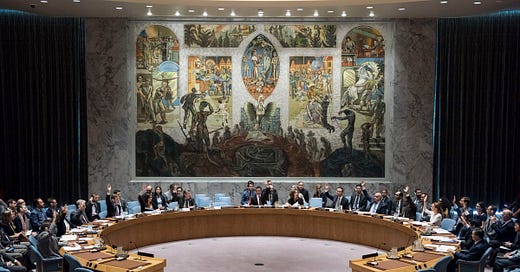The Incapability of the United Nations to Prevent War
Nuclear Deterrence has actually kept the peace better than the United Nations
After the Congress of Vienna in 1815, Western powers were far more reticent to start wars than they had been before. They did, however, consider that war could sometimes solve political problems, in a way which is not so compatible with the spirit of modern international law.
However, this Clausewitzian view of war seems more respectful of the U.N. Charter than the aggressive military doctrine practiced by some of its Western signatories. Indeed, the United Nation’s Security Council’s past decisions to allow military intervention have often not met even Clausewitz’s rationale for war; namely the exhaustion of all other means of issue resolution.
The U.N. Security Council authorisations that since 1945 have allowed some member States to use force against other members, have often had underlying interests other than the stated one of “restoring international peace”. Predictably, the results of many of these U.N. sanctioned military interventions have generally been disastrous; often exacerbating conflicts and leading to the dramatic suffering of civilian populations. Truly shocking examples are the following US military interventions that made a mockery of the U.N.’s ideal of peace:
North Korea 1950; the infamous US “police action” approved under U.N. Charter Article 42, during the temporary absence of the USSR’s permanent representative to the U.N. Security Council,
South Vietnam 1966; Article 51 invoked, South Vietnam’s self-defence used as a pretext to allow US escalation in the war in Vietnam, leading to millions of casualties in three countries (Vietnam, Laos, and Cambodia).
Kuwait 1990; Article 42 invoked, starting three decades of US onslaught on Iraq and the death of millions of civilians through hunger, disease and war.
Libya 2011; Chapter VII, voted through as Russia and China made the error of abstaining, and finally the scope of which was not respected by NATO.
The U.N. has had a problem of legitimacy and objectivity since its inception, which has been aggravated since the end of the Cold War. The U.N. has indeed been accused, often with good reason, of being a tool of US foreign policy, as the previously mentioned resolutions highlight.
Even worse, the UN Charter and the legal legitimacy of the U.N. Security Council (UNSC) have simply been disregarded by the US government in Serbia in 1999 and Iraq in 2003, setting a dangerous precedent. Today, of the permanent five veto-wielding members of the UNSC, three of them are now adversaries of the other two, and this is preventing the UNSC from making any significant contribution towards restoring peace.
What kept the peace, at least in Europe, between the two geostrategic and ideological Cold War rivals was arguably more the nuclear deterrence than the existence of the U.N. Charter, even though the USA and the USSR did several times come unintentionlly but dangerously close, to using nuclear weapons.
The U.N.’s role in enforcing international law is today almost non-existent. The absence of the U.N. in helping to solve the conflict between Russia and NATO is glaring. The U.N. Charter is thus simply a legal framework that works - de facto, not de jure - only as long as all of its most powerful - and permanent - members adhere to it in both spirit and letter. In reality, international relations between nation-states are still to a large extent power relationships, as in the days of Clausewitz.




